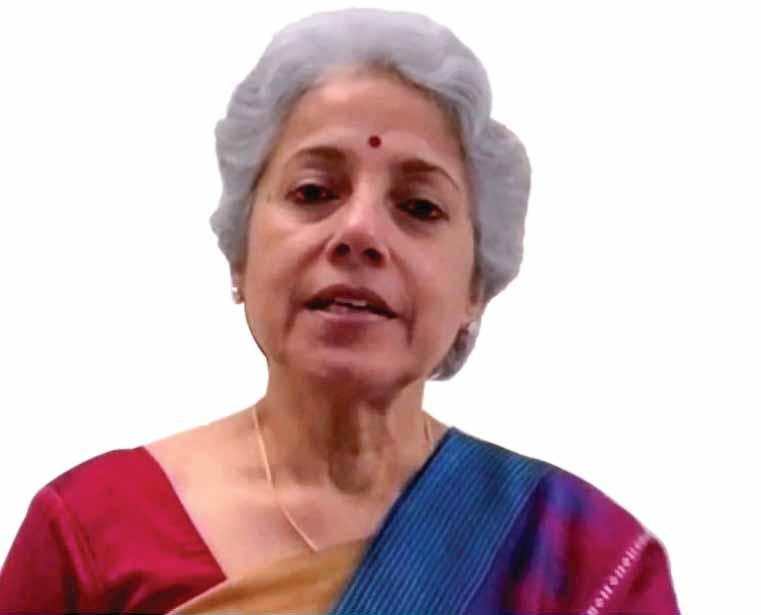
60 minute read
Our diversity allows us to be so brilliant & shine brightly
Our diversity allows us to be so brilliant & shine brightly Jennifer Jones
Rasheeda Bhagat
Advertisement
The future of Rotary is what you have created here… the kind of technological leap Rotarians across the world have made in the last 10 months. To be able to assemble a group like this and be together in a such a fantastic shared experience is the future. All of you were able to jump onto this kind of virtual platform so quickly and make it a global community,” RIPN Jennifer Jones said, while addressing two different meetings on virtual platforms, created by the Rotary Club of Madras, RID 3232, and the Synergy Rotary Friendship Alliance. The latter has been created and fostered by PDG Sunil Zacharia, RID 3201, with membership across 11 Asian countries.
She said it was wonderful to see such a huge participation at both the events; while at the RCM meet, 525 participants from 25 countries logged in, at the Synergy meet 390 participated from all over the world, including three past RI directors, six district governors, 14 DGEs, and 10 DGNs and 35 past governors participated.
To commemorate her virtual visit, RCM donated two dialysis machines to the ACS- RCM Dialysis Centre that the club has set up at a hospital near Chennai. “This increases the number of dialysis machines available for patients with renal failure to seven,” said club president Kapil Chitale.
He added that club members had also planted 117 more fruit-bearing trees on its 35-acre plot that houses the RCM Boys Town Society, a flagship project of the club. The number of trees mark the 117th year of Rotary starting in July, 2022, when she will assume the office of RI president.
Jones said that Rotary’s international passport has never been so relevant as now. To be able to connect so easily and remove borders and boundaries is something that Rotary has done for decades and decades. “But to put that global stamp on our passport as we are able to traverse the world through these virtual meets is wonderful.” While during the Covid pandemic, she had been on so many such virtual meets, and made new friends across the


Get ready for vaccination advocacy
We’ve been through many dark days in the last several months and there isn’t a man, woman or child who hasn’t been touched by this global pandemic. But in a unique way, this pandemic has galvanised us, and proving that we are people of action, we quickly realised the need to remain united, connected and together in shared service. You’ve all jumped onto virtual platforms and perfected them, as you’ve done today to bring along so many participants from several countries.”
The new year had begun with hope, and “one-by-one we are going to get vaccinated. And we are going to speak about it to our neighbours and friends because we are the vaccination people. countries, which was ready to tackle both polio and PolioPlus, the ‘plus’ in that would now be Covid, apart from malaria, tuberculosis, etc.
Jones added Rotarians were distressed to know that from March 2020, when the world went into a lockdown, we’ve had to take a pause in polio vaccination. “But just imagine, those frontline workers were able to pivot and go from being polio to Covid frontline workers. While they had to pause on polio vaccination, they didn’t pause on doing surveillance and contact tracing, to identify where Covid exists, so we could shut it down. This infrastructure also helped to shut down Ebola and we should be so proud of their efforts.”
We stood up and said polio could be eradicated. And we now need to use our voices for those who have vaccine hesitancy and let them know this is a safe procedure which will prevent them from getting infected.”
Jones wondered if, as a Rotary leader had once told Rotarians in her region, “we had told Rotarians 30 years ago that we need you to immunise three billion children against the polio virus and raise more than $2.1 billion and it will take us over 30 years to eradicate this disease, would we have done it?” The likely answer is a ‘No’ because it would have been seen as an impossible task.
But thanks to polio immunisation, Rotary now has a public health infrastructure, formed along with its partners such as the UNICEF, WHO, the Gates Foundation, etc in over 70
world, “which is incredible, but man, I am looking forward to the day we can all meet in person. But to have made so many new friends, isn’t that incredible? It shows that Rotary’s future is incredibly bright. Thank you for the leadership you have shown. When we come out of this, and we will, this will remain because of the kind of synergy you are going to establish in the weeks and months ahead, before the ‘normal’ returns,” she told the Synergy meet.
On Rotary’s future, she said that each of the Rotarians who had made it “a priority to stay engaged and connected like this “is the future of Rotary”. But a challenge before all Rotarians was to look around their clubs and ensure that others too were having similar experiences, and were the horizon hope, dangling in front of us as vaccines are here.”
That these Covid-19 vaccines had been manufactured and in the hands of people in less than a year was “magical. Till those vaccines open up to us, we cannot really travel the way we used to. The video you showed of Kerala makes me itch to travel, it is on my bucket list, and has been for some time,” she told the Synergy meet. She also hopes to make it in person for the Zone institute to be organised by RIDE A S Venkatesh in December 2021 at Mahabalipuram in Chennai.
But right now, the onus was on each and every Rotarian to think of their fellow members at the club levels, as this is an important ethos of Rotary — after inviting a person
involved with group meetings, not feeling left behind, felt cared for, nurtured. “When we connect, even though we might be locked down, people get the assurance that they are traversing through these challenging times together. We see on
The onus is on each of us to
check on our club members on
how they are doing with their
mental health. There are so many
stories of people struggling...
losing money, jobs, etc.
Promoting youth and women’s membership
At both the RC Madras and Synergy Alliance meets, RIPN Jennifer Jones was asked about promoting younger and women members in Rotary and how she had managed to break through the “glass ceiling” and reach the topmost position in RI.
Jones said that for “the better part of the decade we at Rotary have been trying to attract women and younger people under 40. This has been a priority, but quite candidly, the needle has moved in a negligible fashion in those two categories. Women and younger people who are looking for a leadership experience have to see that opportunity in Rotary.” She hoped that with the focus now being on “diversity at the highest level of our organisation, and with a woman president, this will hopefully inspire many female and younger members to join Rotary. I do hope this will challenge and be an inspiration to women to take on leadership positions, beginning at the club and then district levels. Showcasing the best practices of inclusion will foster growth.”
She said that even though Rotary needed “young thinkers, having a prescribed age group is not the way forward.” All of us, she added had surely met a 25-year-old who thought like an older person, as well as an 85-year-old whose thinking and perspective were akin to a young person. “What we need is progressive thinking to take us forward.”
On bridging the gender gap, Jones advised Rotarians to take up this issue from a “business perspective. If in our company we were looking at a market share that was underperforming, what would we do?”
For instance, female membership in Rotary was only 24 per cent women, though it was higher in some areas — in North America it was about 35 per cent and in the Caribbean region between 48–52 per cent. “We would
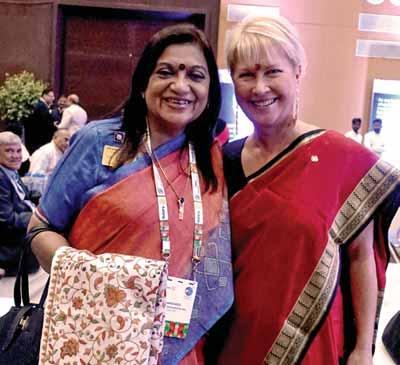
RIPN Jennifer Jones (R) with PDG Shyamashree Sen (file photo). Rasheeda Bhagat
into Rotary, “ask them what they want out of that experience and then deliver it.”
Jones said often more attention was given to people who join and leave Rotary, than “focusing on those who stay behind and what their expectations are. The answer is quite easy; research tells us that they join for friendship and service. We all want to get our hands into something that makes a difference in our world, and our vision statement tell us that we join together with people to create lasting change.”
But most important of all is the change that Rotary gives as an opportunity to its members to bring within themselves. “Isn’t the opportunity to improve our leadership capabilities and attain personal growth, a gift we can offer others, to join us in friendship and service,” she asked.
She advised Rotarians to check in on their club members to “to see how they are doing with their mental health. There are so many stories of people struggling, whether it is losing money, jobs, or food and other issues.” It was imperative to check that other Rotarians were not grappling with isolation or mental health issues, “so that people understand that even in the darkest hours there is hope.”
tweak our business plan. Similarly, let’s take the opportunity to bring a gender balance in Rotary.”
RI Director Valerie Wafer chairing RI’s new diversity, equity and inclusion taskforce said, “we need these challenging conversations in our own clubs.”
But she cautioned Rotarians that they would need to focus at “the best and brightest in both men and women. At RI, over a year ago we embraced and adopted a new diversity, equity and inclusion statement, and this is happening in governments, NGOs and companies around the world as well. So let us take a close look at how do we create a diverse perspective in our clubs. That will help us solve some of the world’s most pressing challenges. It’s because we are able to look at things from a different perspective, and bring together a mosaic of people from different regions, cultures, age groups and backgrounds, we’re able to solve some of the problems of the world.”
On women Rotarians overcoming the glass ceiling and getting mentorship for leadership positions is “something we need to be more mindful of when it comes to nurturing our members, both male and female and giving them leadership opportunities.” One way to achieve this was by ensuring that “the same people are not doing the tasks again and again; tap new leadership opportunities, give them these roles, along with the wings to fly. “We have to look for the best and the brightest, fresh ideas, and give opportunities to the new leadership to blossom and grow. The seniors and veterans should do that.”
As for reaching the top RI position, Jones said: “I did it just like my male colleagues have done; we have all filled different positions in leadership roles from the club president to the DG level, then serving on the RI board, one of the requirements for becoming an RI president. And I was also fortunate to be able to serve as a TRF Trustee and in different leadership positions participate in conversations with world leaders.”
Adding that there was an “opportunity for all of us, both men and women, to increase our leadership role in Rotary”, she said: “I was pleased, humbled ad excited by the opportunity to be nominated RI president, and this is a positive move forward for Rotary too. But I firmly believe I was not selected because of my gender but because of my qualifications.”
I was pleased, humbled ad
excited by the opportunity to
be nominated RI president. But
I was not selected because of
my gender but because of my
and ensure that we are a true reflection of what our community represents. In some parts of the world that dialogue might be of age, in other parts, of gender and culture.”
But even though this dialogue will differ in different regions, the end result will be the same, “making sure that we are a true reflection of our communities. It is the diverse and unique perspective each of us brings to our club that helps us tackle and solve some of the most difficult problems that our community or country faces. Because we come at it from different angles, we are able to challenge each other and give our very best. If we all looked at the problems through the same lens, we would not be so brilliant, shine so brightly and provide hope,” she said.
The RIPN congratulated RC Madras members for “playing such a crucial role in throwing out polio from India. Commending the club members “for the wonderful service projects that you do”, she added she was greatly touched by the two projects they had launched in her honour and said she would use the first opportunity to visit both in person.
In a Q&A session moderated by PDG Shyamashree Sen, RID 3291, Jones said that in the coming times, e-clubs will have a bigger role, “they will thrive, survive and grow. Assembly of people from different parts of a country and even different nations will only grow. Actually, the pandemic has moved us ahead by 5–10 years as we have been forced to come out of our comfort zones and go into technological innovations and newer platforms.” Answering another question, she said “diversity, equity and inclusion” will continue to get much more focus in Rotary. In her year, she would give this a priority “in a voice of authority. We will be viewing all three through different lens of gender, age, race, religion, culture and sexual orientation. I will be challenging Rotarians to have some of these difficult conversations

Planning a Virtual









Institute





Clockwise from top left: From L: RID Kamal Sanghvi, Sonal, Mohak (Rtn Gagan Dudhani’s son), PDG Sandeep Narang, Shristi (PDG Sanjay Khemka’s daughter), Raavishu (RID Kamal Sanghvi’s son), Anu Narang, PDG Sanjay Khemka and Minakshi; Institute convener Kamal Sanghvi and Sonal; Institute chair Sanjay Khemka’s son Shubham and daughter Shristi, alongwith his office staff Snehlata and Kajal, managing the helpline centre; A nostalgic recall of the Institute originally planned at Kochi and promoted at Indore in December 2019: RIPE Shekhar Mehta, Rashi; RID Kamal Sanghvi, Sonal; and Madhavi Pandya with wives of IPDGs at the Indore Institute.




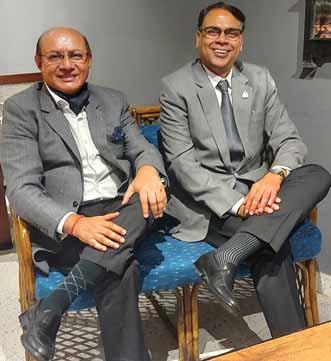



A dance performance at the institute.
Above: Institute convener Kamal Sanghvi and chair Sanjay Khemka.
Below: (From L) Anu, PDG Sandeep Narang, Sonal, RID Kamal Sanghvi, Minakshi and PDG Sanjay Khemka.





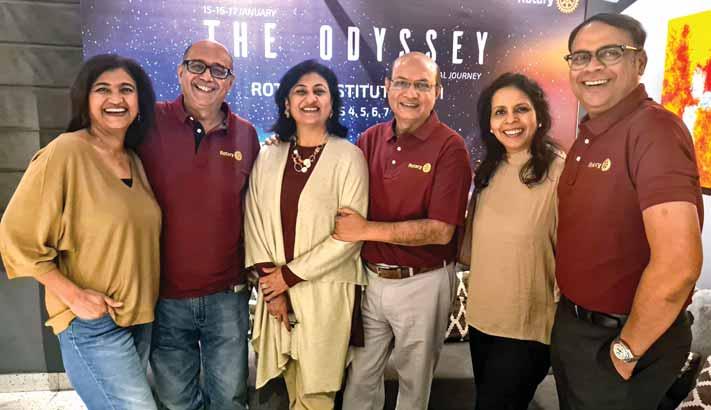
Next Institute at Mahabalipuram Chennai
V Muthukumaran
Look forward to the next Rotary zone institute at Mahabalipuram, a heritage town replete with Pallava architecture near Chennai, on Dec 10–12. “Mahabs Rotary Institute will be a stellar example of both purpose and pleasure as Rotarians can listen to eminent speakers in engaging sessions and also indulge in dance, music, fun, laughter and gala merriment in the backdrop of exotic beaches, enjoy thoughtful fusion and authentic delicacies at a luxurious seaside hotel,” said PDG M Muruganandam, RID 3000, event chair, at the virtual Rotary institute.
In his address, RIDE A S Venkatesh, convener, Mahabs institute, said the delegates would have an opportunity to network with Rotary leaders from the zones, attend interesting sessions and watch some awesome entertainment at “this historic town that boasts of several heritage sites and lovely beaches.” It is also close to other places of interest such as Pondicherry, famous for its Aurobindo Ashram and Kancheepuram, an ancient pilgrim town, known for handwoven silk sarees and Kamakshi Temple. RI President Shekhar Mehta (2021–22) will be there as chief guest.
Mahabalipuram had served as the venue for the high-level summit between PM Narendra Modi and Chinese President Xi Jinping in December 2019.

What’s special about Mahabs?
A curtain raiser was screened on Mahabalipuram which was founded by the Pallava ruler Narasimha Varman during the 3–7th century, and named after the benevolent King Mahabali. Also known as Mamallapuram, the ancient town that lies along the Coromandal coast, off the Bay of Bengal, 37 miles south of Chennai, is a UNESCO heritage site.
The Rathas, the mandapas, the Descent of the Ganges and the Lord Krishna’s butterball are a group of royal monuments that show the architectural genius of artisans here. Other highlights include the Shore Temple, the only surviving edifice of the legendary seven pagodas built by the three generations of Pallava rulers as it took “over 200 years to complete the entire site.”
Every year classical dance and drama festivals are held to preserve and celebrate the ancient culture of the Pallava dynasty, a visual treat for the eyes. The Mahabs Rotary Institute will be held at the Four Points by Sheraton and the adjunct seminars will be conducted at the Radisson Blu Resort Temple Bay.
RIDE Mahesh Kotbagi is the co-convener of the Mahabs 2021, PRID C Basker and PDG Abirami Ramanathan are the advisors, PDGs Surendra Bommireddy is the co-chair, Madhav Chandran the secretary and C R Raju will be the treasurer.

For more details, visit www. riinstitutemahabs21.org.
Rasheeda Bhagat
The very definition of the conventional role of corporates and social responsibility of business as merely pursuing legitimate profit and shoring up shareholder value is undergoing a definitive change, said chairman of the Aditya Birla group Kumar Mangalam Birla, while addressing the inaugural session of the RI zone institute The Odyssey, convened by RI director Kamal Sanghvi.
It was Nobel Laureate Milton Friedman who “famously and rather pithily said that the social responsibility of business is to increase its profits. Ironically, the 50th anniversary of that famous statement came bang in the middle of the Covid-19 pandemic. That statement had weight and logic which explains its longevity but that view is now changing,” he said.
No less an organisation than No less an organisation than the Business Roundtable, an the Business Roundtable, an apex association of CEOs of apex association of CEOs of America’s top companies had America’s top companies had issued a statement in 2019, issued a statement in 2019, redefining the purpose of a redefining the purpose of a corporation. Signed by 200 corporation. Signed by 200 top CEOs, including those top CEOs, including those of JP Morgan, Amazon, of JP Morgan, Amazon,

Kumar Mangalam Birla chairman, Aditya Birla group Walmart, “their joint statement effectively underlines that the paradigm of business is moving from merely shareholder capitalism to stakeholder capitalism. That a corporation should not just maximise shareholder value but also the wellbeing of employees and the community at large. The words of Friedman, once treated as gospel, are now being questioned.” The new maxim of corporate responsibility goes beyond shareholder value, and has a broader umbrella of value, and has a broader umbrella of benefits to all stakeholders. benefits to all stakeholders.
Birla added: “And I’d say that irla added: “And I’d say that while doing so, it must also earn the while doing so, it must also earn the implicit license to operate in society implicit license to operate in society at large.” This is not the “convenat large.” This is not the “conventional license that operated during tional license that operated during the permit raj in India and which the permit raj in India and which was dismantled 30 years ago. This was dismantled 30 years ago. This is what I call the new paradigm for is what I call the new paradigm for corporate citizenship. It is beyond just corporate citizenship. It is beyond just obeying laws and regulations, which obeying laws and regulations, which now increasingly apply to the welfare now increasingly apply to the welfare of employees and safeguarding of of employees and safeguarding of the environment. Good corporate the environment. Good corporate citizenship goes way beyond such citizenship goes way beyond such legal compliance and is all about legal compliance and is all about moral and ethical behaviour. Peter moral and ethical behaviour. Peter Drucker, the father of management, Drucker, the father of management, said a successful business stands on said a successful business stands on the foundation of morality, it is not the foundation of morality, it is not
Rotary commended for its “stellar role” in fighting pandemic
Commenting on the Covid pandemic Aditya Birla group chairman Kumar Manglam Birla said we have started the new year on a note of hope “not only because of the speedy development and deployment of the vaccine but also to have endured, survived and overcome the challenge of a great pandemic with such resilience, fortitude and determination such as shown by our Covid warriors — our frontline health workers, which is commendable.”
He said the year-long response to the pandemic across the globe reflected “all that is noble and uplifting in the human spirit. We witnessed the fearless and selfless dedication of frontline healthcare workers, the commitment and patience of people in law enforcement, and the spontaneous and generous support from the citizens to the governments in their efforts to contain the pandemic.”
While scientists, pharmaceuticals and others had collaborated to come out with vaccines in a record time, private enterprises and Rotarians too played such an “integral and stellar role in containing the pandemic and this is not the first time that Rotarians have played such an important role in a public health crisis. I am told that even during the Spanish flu of 1918, Rotarians were at the forefront of community service. Few institutions in the world can claim to have served humanity through the course of two pandemics, spanning more than a century like you have done.”
Birla said that even for business corporations, a crisis of this magnitude serves as a reminder of the need to give back to society. “True to our legacy, the Aditya Birla group curated a multipronged approach to help local communities fight Covid-19. Apart from the Rs 500 crore financial contribution to Covid relief measures, our group distributed several hundred masks, PPE kits, disinfectants and food packets to the needy. We also earmarked hundreds of beds for Covid-19 patients in our hospitals across the country.”
Saying that every unit in every corner of the world of his group had “so selflessly come to the aid of the local community,” he added: “Personally, I was energised to see so many people in the corporate landscape, large and small, readily and spontaneously joining in collective effort to alleviate the pain caused by this pandemic.”
an inanimate thing but is also expected to be humane, have empathy and be a caring friend of society.”
The industrialist added that in “this new paradigm, the license to operate has to be earned, through respect, credibility and acceptability.” It is based on genuineness and “willingness to match word and deed, abide by principles and ethics, no matter what. Such social acceptance has to be earned and no government or licensing authority can grant it.”
Actually, he added, this Business Roundtable statement was preceded by India’s landmark 2013 CSR law, “which looks in hindsight remarkably enlightened, and India is perhaps the only country in the world which mandates that 2 per cent of after-tax profit should be compulsorily spent on CSR.”
But then, Birla said, corporations “like ours have been engaged in what is now called CSR for more than a century. My great grandfather, G D Birla, was a believer in Mahatma Gandhi’s view of corporations being trustees of social wealth. That spirit has always manifested in our community engagement. It is humbling to know that our corporation has touched the lives of over nine million people through our CSR exercises, so ably led my mother Rajashree Birla.”
Good corporate social citizenship goes well beyond lip service and is not just a tick mark of compliances,
The paradigm of business is moving from mere shareholder
capitalism to stakeholder capitalism. Good corporate citizenship goes way beyond legal compliance and is all about moral
and ethical behaviour.
Even during the Spanish flu of 1918, Rotarians were at the forefront of community service. Few institutions
can claim to have served
humanity through the course of two pandemics, spanning over a century.
motherhood statements or greenwashing as some critics have called it.
Maintaining that good corporate citizenship reflects the internal character of an organisation, “following a code of ethics and values which are its very foundation, and are articulated frequently and visible in the day-to-day operations and lived on a daily basis,” Birla gave a telling example. In the early days of the Covid pandemic, when panic buying was being witnesses all around the world, “a UK retailer opened its store one hour earlier every morning exclusively for senior citizens to buy their provisions. This simple gesture exemplified the empathy and integral values that all good corporate citizens must have.”
Responsible corporations should not only evangelise but get others to join the bandwagon by example, so that good corporate citizenship becomes a movement led by the private sector and not forced by the government or regulations. For example, “our fibre business insists on sourcing wood pulp as raw material only from suppliers who practise sustainable forestry. I am sure such behaviour will soon reach a tipping point,” he added.
Birla also underlined the importance of “the culture of volunteering” in a business organisation. When employees volunteer their time for community service or mentoring youth, they enhance the stature of their employer. He shared that during the height of the pandemic, when migrant workers were experiencing hardship, a call for help within the Aditya Birla group “elicited an overwhelming response with over 26,000 employees of the group helping workers recharge their mobile connections. A corporation can encourage, recognise and reward such initiatives.” Research has shown that employees feel good and energised to work for such corporations and even consumers are willing to value and pay a little extra for products made by companies who follow such desirable practices. “So there is clearly a tangible benefit.”
Quoting the four principles from Rotary’s Four-Way Test, Birla commented: “I find these to be simple but powerful thumb rules to guide the decisions of corporations.” He added that what he was advocating was not “antithetical to creating value and wealth. The leap from goodness to greatness for a corporation is not only the matric of sales and profit. There is an intangible element in good corporate citizenship.”

During the height of the pandemic a call from our group elicited an overwhelming response with over 26,000 employees helping workers recharge their mobile connections. A corporation can encourage, recognise and reward such initiatives.

We need Project Positive Health for 20 years Bharat Pandya
V Muthukumaran
Over the last one-andhalf years, Rotary clubs have done remarkable work in holding Know Your Numbers camps across the country. “Please continue the camps which can be held even in pandemic times as we are checking around 150–200 patients in a camp, hence Covid precautions and social distancing can be observed without difficulty,” said RI director Dr Bharat Pandya, in a session on Project Positive Health (PPH) at the virtual Rotary institute.
Every person must know his or her numbers — height, weight (both give BMI that indicate obesity), blood pressure (that points to hypertension and heart problems) and blood sugar for diabetes. “Obesity, hypertension and diabetes together account for the big NCDs, causing 60 per cent of deaths in India as Indians are culturally and genetically predisposed to these chronic, lifestyle diseases,” he said. He warned that in India the NCDs occur 15–20 years earlier than in western countries. For eg, what usually occurs at the age of 60–75 in the west, occurs at 45–50 in India. “The burden of chronic kidney diseases is the highest in India which is also the diabetic capital of the world.” During the pandemic, the death rate of people with comorbidities is much higher than that of the general population, he added.
One of the positives of the pandemic is the focus it has brought on the importance of good health and secondly, people with comorbidities, those with NCDs, are affected more severely, some of them getting admitted in hospitals and ICUs, he noted.
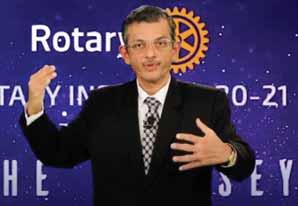
Ready-to-explode volcano The NCDs is a volcano waiting to explode, he said and after a pause, added “let me correct myself. It has already started exploding and if we don’t do something about it quickly, then it is a big problem we are leaving for future generations.” Dwelling on the causes of NCDs, he said improper lifestyle with too much stress; no physical activity like exercise; and bad food and bad habits are three main reasons for the huge spike in patients with chronic diseases.
Indian food is rich in cholesterol, calories, salt, oil and sugar. Bad habits like tobacco and alcohol consumption are on the rise. “People are not aware of the importance of regular check-up and need for lifestyle modifications,” Pandya added.
Rotary PPH has a threepronged approach to tackle NCDs in India — holding Know Your Numbers camps and popularising the slogan Ek chamach kam, char kadam aage through Rotary camps and events. Simply put, the tagline urges you to take one spoon less of salt, oil and sugar in your daily diet and do at least 30 minutes of exercise daily to ward off NCDs. “Adopt this slogan in your life and also make your friends, families and business associates to adopt and implement it in their lives.”
Through awareness programmes in schools Rotary is trying to change the mindset of children on the importance of good habits, healthy food and the need to exercise. “They will go back and change the mindset of their parents, elders and relatives.”
Preventive healthcare As a surgeon, he added, “I am always committed to curative healthcare, but I realise that the future of healthcare lies in preventive care,” Pandya said. PPH is not just a 2–3 years programme, but it should be carried on for at least 15–20 years and beyond. Citing a popular Hindi saying for good health, he said, “keep your tummy soft (diet control), feet warm (regular exercise), and mind cool. If you do the three things, you can overcome and defeat NCD illnesses,” he added.
Teaching is all about giving
Jaishree

Ranjit Sinh Disale, a teacher at the Zilla Parishad Primary School in Paritewadi village, Solapur, Maharashtra, won $1 million as Global Teacher Prize 2020 for promoting girls’ education and introducing a QR-coded textbook revolution in the country. The annual award is instituted by the Varkey Foundation, UK, to honour exceptional teachers for outstanding contribution to the profession. “I have announced that I will share half of the prize money with my nine fellow finalists. It can help scale up their work too. Teaching is all about giving, sharing our knowledge and making people competent,” he said, speaking at the virtual Rotary institute at the RILM session.
In 2009 when Disale arrived at his school, which was a dilapidated building sandwiched between a cattle shed and a storehouse, his immediate task was to ensure that textbooks were available to his pupils in their local language. “I translated the textbooks in Marathi and also embedded them with QR codes to give students access to poems, video lectures and assignments.” His idea was adopted by the NCERT in Maharashtra. “Children unable to visit schools can still learn their lessons from home at their own pace.” He proudly says that 90 per cent students in his school have achieved excellent grades. Without leaving their classrooms his students have travelled to 140 countries ‘virtually’. “They know the culture and language of the people there. It has helped to broaden
Global Teacher Prize winner Ranjit Sinh Disale teaching a child.
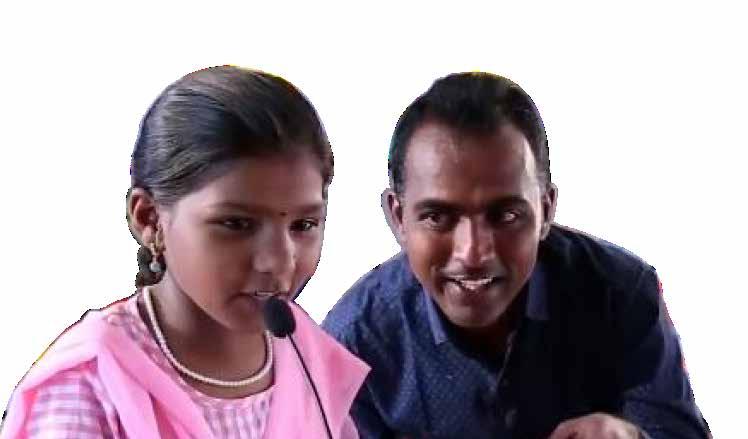
After interacting virtually
with Japanese children, my
students understand how
to respond to earthquakes,
because it is a common
phenomenon in Japan.
their vision. I encourage them to call themselves ‘global citizens.’ After interacting with Japanese children, my students understand how to respond to earthquakes because it is a common phenomenon in Japan,” he said, adding that he plans to allocate 20 per cent of his prize money for his ‘Let’s cross the borders’ project that aims to build peace among students and young people from conflict-torn countries such as Pakistan, Palestine, Israel, Iran, Iraq and North Korea. He also wants to allocate another 30 per cent of the prize money to the ‘Teachers’ innovation fund’ that he plans to set up.
The impact of Disale’s interventions is that there are now no teenage marriages in the village and the school has 100 per cent attendance of girls.
Rotary India Literacy Mission
RIDE Mahesh Kotbagi, co-chair of RILM, said that about 300 Rotary clubs with a participation of one lakh Rotarians from across the country have been working on RILM’s TEACH programmes since its inception in 2014. With the onset of Covid, after which schools had to be shut down, “Rotarians such as Swati Herkal have trained 80,000 teachers in western India in simple, smart online teaching methods and it is being scaled up to benefit teachers nationwide.” The e-shiksha project has helped install audio-visual curriculum in 30,000 schools. The content is approved by the government and is being telecast nationwide and in its educational app, Diksha. “It is expected to help around 15 crore children across India this year.”
RILM is involving school students to mentor adult illiterates in its adult literacy programme. “At least 80,000 adults are functionally literate, thanks to this initiative,” he said. Programmes such as Swabhimaan, Project Dignity and Saksham Bharat are making a great impact in enhancing livelihood of women and youngsters through various skill development programmes by involving Rotary clubs. More than 1,000 single women have found suitable vocations through Project Dignity.
Through Project Saksham Bharat RILM encourages Rotary clubs to enroll youth in any of the branches of Apollo Medskills in their region. The course fee that has been subsidised at `4,400 per student will be sponsored by the clubs. Placements are assured for the trainees on completion of the course.
Around 3,000 Happy Schools and 3,500 libraries have been facilitated through RILM across the country, added Kotbagi. n
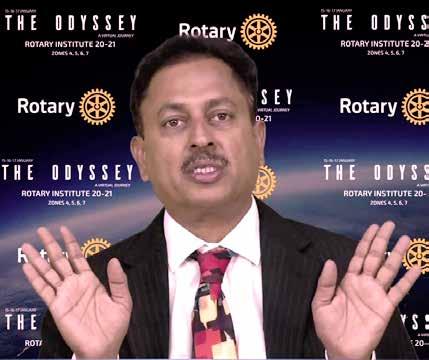
RILM co-chair RIDE Mahesh Kotbagi
Thanks to Disale’s
interventions, there are
now no teenage marriages
in the village and the
school has 100 per cent
attendance of girls.
Rotary must offer flexible options to Rotaractors
Kiran Zehra
One of the critical goals of experience.” Making Rotaract a part across the world can continue being Rotary clubs is to listen and of Rotary will “allow a wider demog- Rotaractors while embarking on their recognise what Rotaractors raphy of people to take on leadership Rotary journey,” he said. want and give them an opportunity roles to better represent their commu- Nishita Pednekar, past DRR, RID to shape their experience by being nities and bring unique perspectives 3170, said the removal of the upper more flexible, said RID Valarie to the table, so that Rotary can truly age limit wouldn’t deter young indiWafer from Canada, anchoring a ses- change the world,” said Samantha. viduals from joining Rotaract. “We sion for Rotaractors that saw partici- join this organisation with the aim of pants from Europe, Africa, Australia, Age relaxation self-development by serving the com Brazil, Japan and South Asia. She On the upper age limit for Rotarac- munity,” she said. was addressing a session at the zone tors being removed, Ojas Joshi, DRR, Patricia Kuhn, member, RI Rotainstitute. RID 3141, said this has enabled the ract Committee and special adviser to
Rotarians must continue their dia- Rotaract clubs to decide on their pro- Trustees from Brazil, said TRF Truslogue with Rotaractors and reach out jects, the impact they wish to create, tees are encouraging Rotary clubs to to them for ideas and suggestions, she and also the people that they want work with Rotaract clubs on global said. Samantha Fewster, chair, Rotaract to engage with. “Many Rotaractors grants. TRF has made it possible for Australia Multi-District Information “Rotaractors to use global grants in Organisation (MDIO), said “Rotaract otaract their projects. We first have to learn offers an incredible opportunity for nity for how to use this resource, and who young people to learn and grow with w with can teach us better than the Rotarians other people in a supportive environnviron- themselves. Besides, this is also a way ment at a similar stage in their life. We ife. We to get closer to Rotarians.” learn leadership and business skills, and lls, and On being the first Rotaractor from other useful skills through our service service Brazil to be selected as special adviser to the community.” She asked Rotaracotarac- to TRF trustees, Patricia said, “I have tors to apply these skills in their daily ir daily learned a lot from the trustees. They lives, workplace and local communimmuni- show us that when different generaties. The new skills will help them if them if tions work together, our knowledge they want to take leadership roles in oles in and ideas come together to build an Rotary in the near future, she said. aid. even more solid future.”
The decision to elevate Rotaract aract Rotary’s partnership with Toaston par with Rotary, she said, will ill masters is an “exciting alliance,” make “years of service in Rotaract ct said Karthik Kittu, past DRR, RID count when Rotaractors choose se 3190, and founder president, Rotato join a Rotary club. This means ns ract South Asia Multi-District that young people will be able to o Information Organisation (RSA take positions that were denied d MDIO). “This partnership will to them previously for want of f help Rotarians and Rotaractors


RID Valarie Wafer

grow personally and professionally. It will also help us strengthen the skills of Rotaractors and help them make a better impact in their communities,” he said. Ronald Kawaddwa, chair, RI Rotaract and Interact Committee, Uganda, answering a question on whether dual membership for Rotaractors will be beneficial to Rotary, said, “Yes, it does in two ways. One, you are an equal member of both Rotary and Rotaract. Two, young Rotarians can be good mentors to Rotaractors who join Rotary clubs.” Rotary clubs, he said, should embrace younger members because they serve as ambassadors who will encourage Rotaractors to join their clubs.
Kazuho Sano, Rotaract vice-secretary, RID 2840, Japan, said that he is looking forward to play an active part in Rotary and is hopeful the newly-introduced Rotaract dues will not affect membership. “Students or working members on an average spend $300 for coffee annually. All we have to do is convert our coffee dollars as dues,” he quipped.
Yatin Sehgal, president, RSA MDIO, said the recent RI amendment that Rotaract clubs can be chartered with or without sponsoring Rotary clubs is a revolutionary decision. Talking about numbers, he said, “Over the past six months, we have seen an increase of 1.65 per cent in the growth of Rotaract clubs as compared to the last three years. In Southeast Asia, the response is amazing because we already have around 261 Rotaract clubs coming up.”
From RI President Holger Knaack’s home district in Germany, Doris Grimm, chair, RI Rotaract Committee, said that it was beneficial to have direct representatives as advisors to both the RI board and TRF. “By having advisors to these two boards, we show that we are not only talking but actually acting upon Elevate Rotaract,” she added. Calling the youth of today “a vehicle of social change,” Akansha Sanghvi, charter president, RAC Mumbai Zenith, said to promote fellowship through service “people must join hands and come together for a cause that can create everlasting change.”

Malegaon Rotary club organises a medical camp
RC Malegaon, RID 3142, organised a medical camp at Tatani, a remote village in Baglan district, Maharashtra. Over 800 villagers including women and children benefitted from it. Over 20 doctors attended to patients with issues pertaining to blood pressure, diabetes, arthritis, and infections of skin, eyes, and ears. Eleven patients with cataract were surgically treated at the Malegaon Rotary Eye Hospital for surgery. The club had arranged transport
Team Rotary News

Patients at the Rotary Eye Hospital after cataract surgery.
and food for the patients and their caretakers.
The visitors to the camp were given face masks and sanitisers and the doctors advocated them to follow all the protocols such as handwashing, use of masks and sanitisers and maintaining social distance to protect themselves from Covid.
Need to mount a campaign against climate change
V Muthukumaran
The need to save the environ- absolutely unbearable, for 0.0001 per talking of 50 per cent GHG emissions ment and our planet so that cent of people control more wealth from non-sustainable food supply future generations can live than half of humanity. We forget system,” she explained. safe, secure and happy with plenty that pandemic roots are in ecological of trees and biodiversity, was the destruction and over 300 epidemics Chipko movement single-point agenda of the two insight- have come as our greed invaded the In the early 1970s, the Chipko activful sessions at the virtual Rotary insti- forests in the name of feeding the ists hugged the trees on the foothills of tute. Ecology warrior Vandana Shiva world. the Himalayas to protect its rivers and and nine-year-old Licypriya Kangujam mountains. At the Navadanya Farm, from Manipur, discussed issues such Corporates vs well-being a biodiversity hub, in Tehri Garhwal as climate change, pollution, epidem- Vandana observed that only 10 per cent over 2,000 crop species, 750 rice and ics and eco-friendly organic farming to of genetically-modified soyabeans 250 wheat varieties are grown through ensure sustained prosperity for human grown in the Amazon forests by burn- organic farming. “Food is the currency beings in an ecosystem that respects ing the lungs and livers of the earth of life; our health begins with food. A the wellness of all living beings includ- are used for human consumption, the non-sustainable, unjust food system is ing plants. rest go to animals and biofeed. “We are behind all emergencies we face, includ-
This pandemic is considered a destroying the very fabric of the earth ing climate change, existential chalhealth emergency, “but we fail to for a handful of companies.” Nearly lenges, health and pandemics. When understand that there were pandemics 20 per cent of greenhouse gas (GHG) you apply chemicals, then the food turns and epidemics in the last few decades emission comes from destruction of counterfeit. Chemicals are not part of the as we have deregulated commerce and forests in the last 2–3 decades. If we nutrition cycle as they kill soil microorcelebrated greed as the highest end of add to it the contributions of indus- ganisms, the butterflies, bees and pollihuman activity which is measured trial and global food systems, that nators that give one-third of our food.” in terms of economic growth,” said f economic growth, said is destroying our is destroying our health, “we are health, we are Our food has lost 60–70 per cent Our food has lost 60–7 Vandana. Wealth is created by extracWealth is created by extrac- of nutrients due to chemicals in agriof nutrients due to chemic tion from the earth, farmers, societies he earth, farmers, societies culture and then we fabricate a part of culture and then we fabrica and communities. “But true growth unities. “But true growth our food as junk food. “We pay our our food as junk food. “W should promote growth of trees, chilmote growth of trees, chil- farmers just 0.04 paise for a packet of farmers just 0.04 paise for dren’s well-being and community ll-being and community chips which will make our children chips which will make ou welfare,” she said. Bhutan stands she said. Bhutan stands obese and diabetic.” Biodiversity is the obese and diabetic.” Biodive out as it has measured its wealth by s s measured its wealth by health of our ecosystems and “Rotary health of our ecosystems an Gross National Happiness instead onal Happiness instead will have to join us in the journey next will have to join n us in n the e jo of GDP or GNP. GNP. decade to create an economy of care decade to create an econom
Conquests and militarism are ests and militarism are that regenerates earth,” she pointed out. that regenerates earth,” she p at the roots of violence against the of violence against the earth and people, leading to divieople, leading to divi- Pass climate laws Pass climate laws sions in society. “The inequaliciety. “The inequali- Calling for world leaders to act now to Calling for world leaders to ties in our society have become society have become find long-term and permanent solufind long-term and perma tions to pollution and other ecologtions to pollution and oth ical crises, Licypriya who grew ical crises, Licypriya up in Bhubaneswar, said she up in Bhubaneswa

Licypriya Kangujam climate activist
had to drop-out of school in 2019 as she could not commute to Delhi from Odisha frequently to stage protests in front of the Parliament and “my father could not afford the travel expenses. I miss my friends, teachers and this is an emotional time for me.”
She is urging PM Narendra Modi and the MPs in Parliament to pass climate change bills into laws to control carbon Vandana Shiva emissions and GHG. She ecologist wants climate change to be included in school curriculum so Worrisome trend that India mounts a fight at the grass- Painting a gloomy picture, she said the roots level. Licypriya has launched the bushfires in Australia, and California ‘Monday for Mother Nature’ drive for wildfires to destruction of Amazon schoolchildren with a target of plant- and Siberian forests to melting of the ing one million trees a year; so far 3.5 Himalayan snow caps and rising sea lakh saplings have got new shoots. levels, have all contributed to make the earth warmer. “Many children lost their homes with climate change becoming a global emergency, but our world leaders don’t have the time to talk to us,” she said. The best gift one can give her children is not an expensive car or wads of money, “but a beautiful planet for which we need to change the world, starting from the family.” The founder of The Child Movement recalled that taking part in the UN’s disaster management conference in Mongolia as a six-year-old was a life-changing experience for her and Greta Thunberg from Sweden influenced her thought process. She was the recipient of the Global Child Prodigy Award 2020 by Puducherry Lieutenant Governor Kiran Bedi in New Delhi.

Doing Good with TRF help
Rotary facilitates paediatric heart surgeries
Team Rotary News
Sixty-six little children hailing from underprivileged families were surgically treated for congenital heart diseases at the Satya Sai Sanjeevani Hospital in Palwal, njeevani Hospital in Palwal, with some toys Haryana, thanks to the dedicated efforts of RC Gurgaon ted efforts of RC Gurgaon in the presenc Harmony Iberis, RID 3011. The surgerThe surger- PDG Vin ies costing `1.65 crore were sponsored ponsored tary M through a global grant support from ort from bers RC Fort Wayne, RID 6540, USA. USA. wit The children came from various rious U states across the country. Club Club th president Mukta Malhotra, past past president Abdul Aziz Seyid yid an and club member Vivek Gour ur tal. “W together contributed `29.6 lakh kh hosp towards the project. theat
In sponsoring the surgeries, es, We ho Rotary has not only saved the he deeper lives of these children but it has s Club president childre also given life to their fami- Mukta Malhotra treatm lies, said Mukta at a simple with a child patient. long if
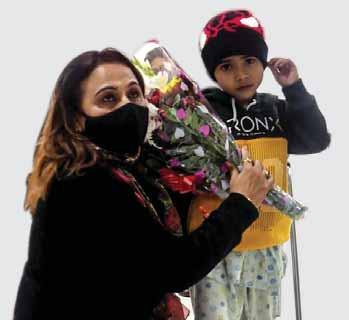
event organised by the club at the hospital to cheer the children and their families. Gift of Life certificates, along with some toys, were given to the children in the presence of DG Sanjeev Rai Mehra, PDG Vinay Bhatia and district secretary Mohit Anand Bhatia. The members of the partnering club, along with DG John Frische from the US, joined in the celebration through a virtual platform. The club provided a heart and lung machine to the hospital. “We have been supporting the hospital in building its operation theatre and an ICU through GGs. We hope to have such larger and deeper associations as over 15,000 children are registered and awaiting treatment and many will not live long if left untreated,” said Mukta.
THIS IS OUR ACTION PLAN.
OUR PRIORITY WE’RE INCREASING OUR ABILITY TO ADAPT
Our Action Plan calls for us to become more nimble, responsive, and open to new ideas. As the Covid-19 pandemic has shown us, the world can change fast — and in ways we can’t always prepare for.
But we’ve also learned our members are resilient and willing to use every achievement and setback as an opportunity to learn and innovate. We can balance the old with the new — and create the kinds of experiences, relationships, and structures that will carry us forward.
What we will do
Use technology to make more connections and create new opportunities for participation
Listen to diverse voices when making decisions about Rotary’s future
Create space and resources to support and test novel ideas
Improve governance models, structures, and business practices.
What your club can do
Build
A fund for trying new ideas or activities
Try
A new meeting schedule, location, or format
Re-evaluate
Your governing structure to be more effective
Invite
Non-member advisers to share new perspectives
Want to know more?
Rotary, Lions can complement each other: RIPE Shekhar Mehta
Each one bring one will be the new membership slogan that will be launched in the first week of February, along with Rotary’s annual theme, “as we want to shift the responsibility of membership growth from the topmost level to the club, grassroots level,” said RIPE Shekhar Mehta speaking at a webinar hosted by the Eastern India Lions Leadership Academy. He expressed concern over the fact that due to the pandemic, money allotted for the development programmes, is being diverted for vaccines and immunisation drives. “We have to contend with rising job losses, dropouts from schools and poverty in the current situation,” he said.
On the positive side, the pandemic has taught some important lessons for us to lead a better, healthier life. “We have to respect the environment. A healthy lifestyle with family as the key is critical for us to stay connected with our dear ones. We have to adapt to a minimalistic approach to life with a hybrid outlook as the way forward,” Mehta elaborated.
The RI board has taken a decision to participate in the Covid vaccination drive and “we will leverage from the brand we have created in polio eradication.” Rotary is in touch with the state governments and “we have been invited by some to play a role in the vaccination.” He cited the recent help sought by a top UP bureaucrat in kicking off the vaccination process in India’s biggest state as he was aware of the “Rotary doctors


V Muthukumaran
and paramedics who are acquainting themselves well as frontline warriors in the fight against the coronavirus.”
Complimenting NGOs Both Rotary and Lions must come together to collaborate and complement each other as there is growing demand for humanitarian services in the world, he said. “While Lions have excelled in eyecare and related services, Rotary has different focus areas such as literacy, water and sanitation. We should work in tandem with corporates and local governments. To begin with we can start with a small project, but without forgetting the larger picture,” he said. Both the said. Both the organisations must forge partnerorge partnerships at the grassroots level to ts level to make an impact as “we have “we have done in polio by forming a orming a broad alliance with the WHO, he WHO, UNESCO, the Gates Founes Foundation and other local organial organisations.” Recalling that he had hat he had set up 15 eye hospitals (11 in itals (11 in West Bengal), he said that Rotary d that Rotary will be more interested in sharing ted in sharing expertise with Lions which is ns which is known for its contribution ibution in the eyecare field.
Gender barrier When he takes over as RI president in July 2021, he will be presiding over an RI board which has nine women among its 19 members. “It takes at least 30 years for women to rise up in the Rotary hierarchy from the club, district to the top-most level. Now that the glass ceiling is broken with the appointment of RIPN Jennifer Jones, I hope the gestation period will shorten for women leaders to claim their right place in Rotary,” he said. Mehta was confident that this webinar would have a domino effect “leading to action on the ground for us to evaluate further and take the collaboration to the next level.”
RIPN Jones said both the service organisations were trying hard to “find the right matrices and measuring
RIPN Jennifer Jones
tools to evaluate the impact of their community projects. We are economic engines that drive the world. Though Rotary has disbursed around $29 million through Covid response grants and other grants, at the district and club-levels we would have done relief projects worth over $100 million.”
Women’s membership in Rotary stood at 25 per cent and “they should be given opportunities to develop their leadership skills. For this to happen, diversity, equity and inclusion are critical for our growth,” she said. Age, gender and sexual orientation are challenging issues which will have to be tackled for Rotary to expand its membership, Jones noted.
Douglas Alexander, first vice- president, Lions International, from Brooklyn, New York, said, “we have to embrace change to adapt to new ways of communication for us to move forward. Now more Lions are attending online meetings and our doctors and nurses are reaching out to families.” He recalled the efforts of Lions in cancer and diabetes treatment in New York to point out that using technology has made a big difference. “We need to share our success stories with rest of the world,” he said. Brian Sheehan, second VP, from
Douglas Alexander Vice President, Lions International
Minnesota and Dr Patricia Hill, third VP, from Edmonton, Canada, shared their perspectives on coping with the ‘new normal’. Past Lions International directors A P Singh and Sangeeta Jatia moderated the discussion that saw a participation of over 900 Rotarians and Lions from across the world.
Jalandhar Rotarians distribute winter jackets
In a multipronged initiative, more than 20 volunteers from RC Jalandhar, RID 3070, came together to distribute winter jackets to 550 underprivileged families. “We formed micro teams for project execution across different parts of the city. The project was conceived and sponsored by PDG S V Hans,” said Jasmin Pannu, wife of club president Prabhpal Singh Pannu.
A special distribution drive was conducted at the railway station for the benefit of coolies and other Railway staff
Team Rotary News
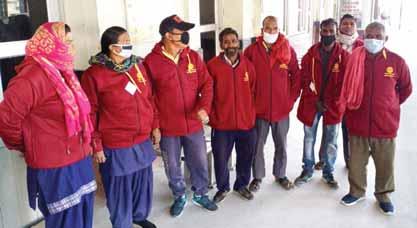
Club members with beneficiaries.
and the club organised programmes at places like sports academies and slum colonies for bulk distribution of winter jackets.
The beneficiaries included rickshaw pullers, daily wagers, coolies, slum dwellers, physically-challenged people, domestic help and street vendors, besides trainees at the Birring Hockey Academy.
Captaincy is all about blending collective talent: Rahul Dravid
Sporting qualities such as talent, hard work, integrity of purpose, respect for the opposition and the spirit of the game need to come together to achieve longterm consistency and success for sportsmen in their chosen field, said Rahul Dravid, former captain of India cricket team.
In a Q&A session titled Truth Talks with sports journalist Ayaz Memon, at the virtual Rotary institute, he said, “sportsmanship is
V Muthukumaran
important for we have to respect the rules, regulations and understand the larger purpose of this activity. Don Bradman put it right that ‘you are just custodians of that sport for the time you are in it.’ It is not just that one is there in the field only to win, make money for 10–15 years and then move out.”
The 1983 World Cup win has changed the cricket scenario in the country. Till that time “Test cricket was the craze and along with other budding talent in the 1970s–80s, I aspired the 1970s80s, I aspired to become another Sunil to become another Sunil Gavaskar, Gundappa Gavaskar, Gundappa Viswanath and Kapil Dev.” Viswanath and Kapil Dev.” “Sports is not just “Sports is not just about winning or losing about winning or losing and getting financial benefits, but the respect you earn among youngsters in the country. It is all about how you carry and conduct yourself, for you do what you love and inspire the youngsters.”
Facing setbacks, failures How did Rahul Dravid cope with disappointments, setbacks and failures in his career? Of course, not able to win a World Cup and getting knocked out early in the 2007 tournament still rankles him. “I had to face such failures and learn from it, but couldn’t dwell on it for long as we have to look ahead. We can’t think hard on past setbacks.” In 2004,
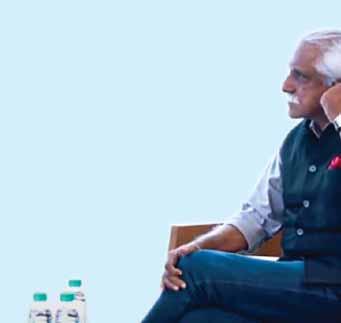
Former Team India captain Rahul Dravid in conversation with sports journalist Ayaz Memon. Dravid led the Indian team for one Test series win against Pakistan on their home soil, then toured West Indies and won the series there after 35 years; and finally, beat England on its home turf in 2007, recalled Memon.
Greats like Gavaskar, Sachin Tendulkar and Dhoni gave up Test captaincy after a series of losses, “but you gave up the leadership after a series win in England. Can you explain that,” he asked.

Replied Dravid: “Soon after the series win in England, I realised that one needs to give 100 per cent energy and mental space for the captaincy and I felt that I was not there, it was dragging on me. I was mentally and physically drained and could not take it forward. So, I decided to give it to someone else.”
On captaincy qualities, the Wall of Indian cricket said, “it has to be a consensual leadership for gone are the days of an authoritarian or dictatorial tenor with information explosion giving rise to a need for pooling in collective intelligence, knowledge to achieve better results.” An India cricket captain must be able to blend harmoniously the collective skills and talent of his team members to achieve results on the ground, he said.
After winning the Under-19 World Cup in 2018, Dravid as head coach got extra money, but “I asked for equal distribution of prize money (to support staff) as it is team effort and everybody contributed for our win.”
Dravid goes by his conscience and that is why he turned down the offer of honorary doctorate from the Bangalore University. “My mom got a doctorate in art at the age of 56–57. So we have two doctors in our family (his wife is a surgeon). But I did not feel like accepting this award from the university for personally I don’t fit into this. I have got several awards such as ICC Player of the Year Award, Padma Shri, Padma Bhushan, etc for my cricketing abilities.”
Having conversations such as this one on sporting principles, roles, challenges, and acknowledging the mistakes of the past and learning from it is a great platform, Dravid added.
Doing Good with TRF help
Rotary opens Covid ICU at Jalgaon hospital
Team Rotary News
ACovid ICU unit was installed at the Dr Ulhas Patil Medical College and Hospital by RC Jalgaon West, RID 3030, through a global grant project by roping in RC Tallahassee, US, RID 6940, as its global partner. The project cost `34 lakh.
An exclusive Covid ward attached to this ICU unit has all ultra-modern equipment including ventilators, motorised beds, defibrillators, infusion pumps and monitors, among others. “The Covid ward is beneficial for not only corona patients but for other treatments also. This ward will be offered free for low-income families,” said Tushar Chitte, club president.
DGs Shabbir Shakir, RID 3030, Jane Pooley, RID 6940, IPDG Rajendra Bhamre, PDGs Kishor
PDGs Kishor Kedia and Rajiv Sharma with club members at the newly set up Covid ICU at the Dr Ulhas Patil Hospital.
Kedia, Rajeev Sharma, also the ARRFC, zone-6, Mahesh Mokalkar, DGN Dr Anand Jhunjhunwala, project chair Dr Sushilkumar Rane and Godawari Foundation, Jalgaon, chairman Dr Ulhas Patil were present either physically or virtually at the ICU inaugural.

Make every drop count
Preeti Mehra
With Rotary International making ‘Supporting the Environment’ its seventh area of focus, we bring you a monthly column ‘Go Green’ with practical tips on what all of us can do individually to save our planet.


There is no doubt that Mother Earth is going through horrid environmental changes. Rising sea levels, melting glaciers and extreme weather events like flash floods are all warning signals. If we want to halt this alarming trend, we can do a lot more than talk about it. We must act and get others to act.
It does not involve making any great sacrifice. The notion that adapting a nature-friendly lifestyle involves giving up on comforts, performing tedious and timeconsuming chores which take the fun out of living is not true.
All that is required is bringing about small changes in our dayto-day habits and the choices we make. Indeed, it will come as a surprise the difference each one of us can make in the long run by sensible use of our resources. The best ‘going green’ begins at home.
Let’s focus on water first. Saving this life sustaining nectar, everyone agrees, is the most effective and environmentally sound way to fight global warming. It is said that if we save water, it will save us in the future.
At every home, water is a precious commodity, though city dwellers take it for granted. So, how much water do we consume? Typical estimates have it that on an average every urban Indian uses 135 litres of water a day, of which only three litres are consumed for drinking. The rest goes into cooking (4 litres), bathing (20 litres), flushing (40 litres), washing clothes (40 litres), washing dishes (20 litres) and gardening (23 litres).
So, what are the steps each of us can take to reduce our water consumption?
Let us start with drinking water. Consuming it is of utmost importance, but the reverse osmosis (RO) system that majority of us use to purify water leaves a trail of wastewater. This impure water that is filtered out can be collected and used in a variety of ways. By putting a large container under the discharge pipe, we can collect the unpotable water which can be used for mopping floors, cleaning toilets and watering plants.
In the bathroom water can be saved through sensible use. Be mindful of not letting the tap running needlessly when you wash your hands, face, brush your teeth or shave. Bathroom taps typically run 7 to 8 litres of water a minute and if they are turned off while brushing teeth or lathering for a shave, the saving per month can be enormous.
The next time you need to change a tap, a shower or the flush
system, opt for a low-flow shower, faucet aerators and a dual flush or low-flow toilet. These new water saving designs and technologies can make a great difference. Also, make sure there are no leaking taps as a leaking faucet can waste 75 litres of water a day and a leaky toilet 700 litres a day!
Washing clothes consumes a lot of water. Minimise use by soaking clothes for a while. This can help in getting rid of the dirt in less washes. For those opting for washing machines, apparently front-loading machines use less water than top-loading ones. More important, if you are shopping for a new washing machine, do go for one that has a Bureau of Energy Efficiency star certification. The five-star certification is the best. These use 30 per cent less water and 25 per cent less electricity than regular washing machines.
Water saving can be done while washing dishes as well. Dish washers are not frequently used in the country, though they too come with star certification. The other method while washing with hand is to fill the sink with water and soap and soak the dishes for a while. Rinsing them then to make them oil and soap-free becomes a simpler task.
In several cities, rains come in plenty and it is easy to tap this rainwater for future use. Rain water harvesting systems are of different kinds. The elaborate ones come with a tank, pump and a purification system. But for a simple rain harvester you only need a large drum, or a rain barrel as it is technically called, that catches water from the roof, sidewalks and driveway through pipes and downspouts. The collected water can be used for hand-watering plants, the garden and even cleaning. But do remember to cover the drum with a lid or tarpaulin so that mosquitoes are kept at bay.
There is also wisdom in watering your plants in the morning as they require less water at a lower temperature.
Overall, the trick is in improving the efficiency of water at every step, reducing its loss and waste. Making every drop count as it were, and in turn promoting a sustainable lifestyle for everybody in our planet.
Make sure there are no leaking taps as a leaking faucet can waste 75 litres of water a day and a leaky toilet 700 litres a day.
The writer is a senior journalist who writes on environmental issues.
Rotary equips Pondicherry hospitals
Samir Kamra, member of RC Pondicherry Port, RID 2981, sponsored a desktop computer worth `50,000 to the Covid ward at the General Hospital and a flake ice maker worth `2.5 lakh to the Indira Gandhi Medical College and Research Institute. Flake ice has a variety of medical and laboratory uses ranging from physiotherapy to instrument calibration and transportation of donated organs. “It will also help in enhancing Covid testing,” said Rajesh Candamourty, club secretary.
Club president M Nandakumar, treasurer Shrikanth R D and Kamra, along with his wife Nalini, handed over the equipment to the hospital authorities.
Team Rotary News
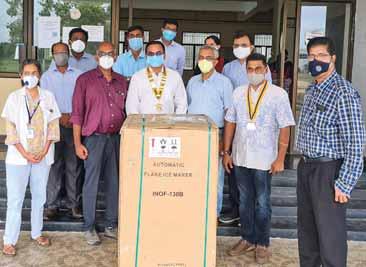
Members of RC Pondicherry Port at the Indira Gandhi Medical College and Research Institute.
Rotary Task Force for Covid vaccination
Team Rotary News
The Covid vaccine has been rolled out in India on January 16 with the first shots being given to health workers and frontline staff.
Senior Rotary leaders in India have formed the Rotary’s Covid Vaccination Task Force in India headed by PRID Ashok Mahajan as its chairman to assist the government in the vaccination drive. “We have had initial discussions on how Rotary can partner in taking the programme to all citizens across India. Our expertise and network in handling polio immunisation programme will be of immense value to the government, especially when it comes to countering some wrong perceptions that will arise from certain misinformed sections in the society,” said Mahajan in a letter addressed to the district governors.
He has urged them to lead a team of volunteers and create awareness about the vaccine among the public. Wherever there is a resistance, proper information must be disseminated about its efficacy. “Our advocacy skills were proved in breaking down the resistance during our polio eradication programme. Rotary has no mileage to gain from this except to save precious lives of people in every household,” he said, and urged Rotary clubs to seek the support of large organisations in their area for utilising their various facilities during the vaccination programme in addition to contributions for the cause.
“We will work together and show that no pandemic is too big for Rotarians in India to handle,” said Mahajan.
Rotary’s Covid Vaccination Task Force in India
Mentor Shekhar Mehta, RI President 2021–22
Senior Advisor PRIP Rajendra Saboo
Senior Advisor PRIP Kalyan Banerjee
Chairman PRID Ashok Mahajan
Vice Chairman PDG Deepak Kapur
Vice Chairman PDG Ranjan Dhingra Advisory Board Members PP S K Jain, RID 3131 PDG Dilip Salgaocar, RID 3170 PDG D N Padhi, RID 3262 PDG Upkar Singh Sethi, RID 3070 PDG J B Kamdar, RID 3232 PP Ajay Saxena, RID 3120 PDG Jogesh Gambhir, RID 3250
Zonal Coordinators (Assigned Districts) PDG T K Ruby (3070, 3080, 3090), PDG Anoop Agarwal (3100, 3110, 3120), PDG Vinod Bhatia (3011, 3012, 3053), PDG Ashok Panjwani (3040, 3054, 3060), PDG Jayant Kulkarni (3030, 3141, 3142), PDG Rajeev Pradhan (3131, 3132, 3170), PDG Kishore Cherukumali (3020, 3150, 3160), PDG Manjunath Shetty (3181, 3182, 3190), PDG C R Raju (2981, 3231, 3232), PDG Sunil K Zachariah (3201, 3204, 3211), PDG Mukul Sinha (3240, 3262, 3291), PDG Vivek Kumar (3250, 3261), PDG Gopalakrishnan (2982,3000, 3203, 3212)


